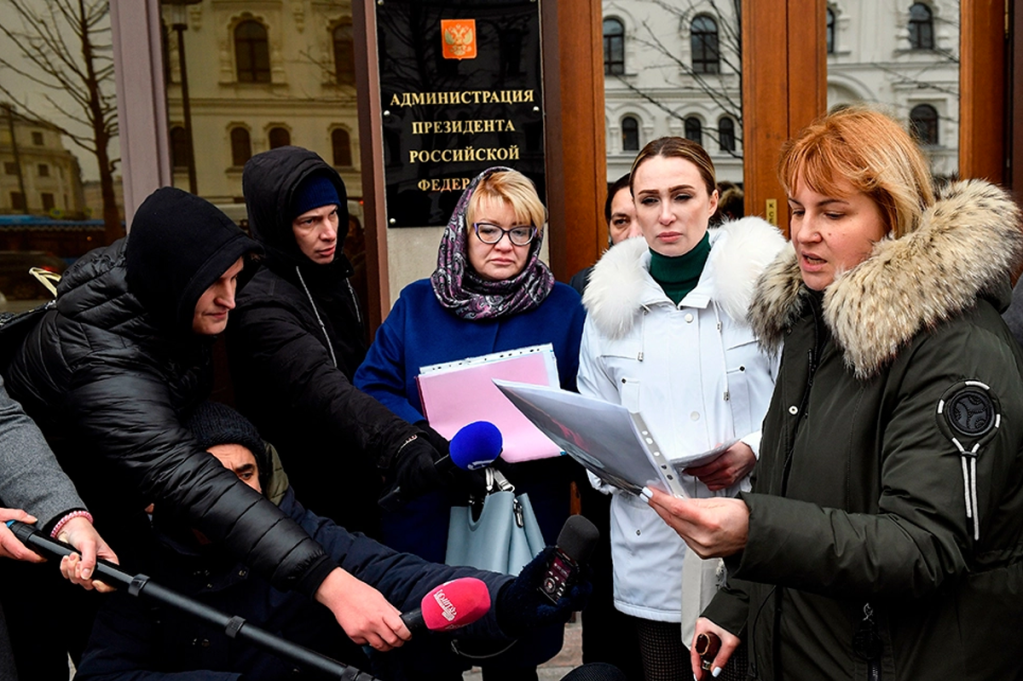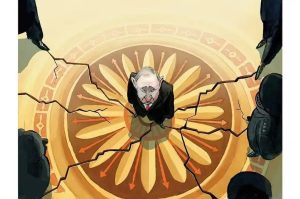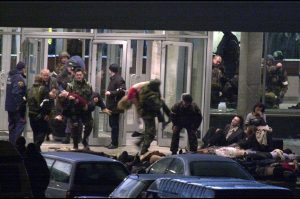The women of Voronezh are very busy these days. Across the Russian city, aunties are busy sewing boots and winter clothing. Relatives are busy crowdfunding for night goggles and drones. Wives are busy demonstrating outside military bases. Mothers are busy making preparations to travel 150 miles southwest where they will cross the border into Ukraine to find and bring home the broken bodies of their abandoned sons.
The wives and mothers of Voronezh are not alone in their efforts, or in their demands that the authorities return their underequipped and undertrained men. In neighboring Kursk region, relatives of mobiks (men called up for mobilization to Ukraine in September) staged a protest on the Russian-Ukrainian border. In Dagestan, women played a key role in the demonstrations that followed Vladimir Putin’s call for mobilization. The protest only died down after the local governor promised that men without military experience would not be drafted.
Ever the self-preservationist, Putin gave governors responsibility for mobilization efforts. This meant he could deflect blame, using local government as a shield from the inevitable backlash. His tactic has worked in some places, like Vologda in northern Russia, where mothers have been bombarding the governor with messages to bring their men home. But lately, more and more of the mothers’ calls, if not yet criticism, are starting to be directed at Putin.
Networks have developed as women try to find supplies and information to help their loved ones. Among these organizations, the Council of Soldiers’ Wives and Mothers has been especially forthright in their complaints. Imitating the Kremlin’s hyper-masculinized language, its spokeswoman accused male politicians of running scared of mothers. She even asked the president to prove he is a real man by meeting them.
The Council shares similar aims — and nomenclature — with the Committee of Soldiers’ Wives and Mothers, who traversed the mountains of the Caucasus to find their sons, dead or alive, during the Chechen Wars of the 1990s and 2000s. Even though the Kremlin designated the group a foreign agent in 2014, the Committee continues to offer advice and support today.
Distraught wives and mothers tell familiar tales of young Russian mobiks abandoned by their officers, armed only with grenades or assault rifles against tanks, forced to dig trenches with their bare hands, fed on moldy rations, thrown into underground cave prisons, raped and tortured for refusing to follow suicidal orders.
Many of these conditions aren’t new. Since February it has been clear that the Russian military is riven by corruption and incompetence, and that soldiers are treated like cannon fodder — or cannon “meat,” to use the gruesomely evocative Russian term.
What is new is the increasingly loud complaints about these conditions from mothers and wives, in particular. Before September, the visible lack of such protests had led many to question why women were reacting differently to Russia’s war on Ukraine, as compared with the wars in Chechnya and Afghanistan. While factors such as the comparative weakness of civil society should not be overlooked, the key difference was that conscripts were sent to those conflicts, while until September contractors were sent to Ukraine.
The mother of a conscript holds a different moral authority to that of a contractor in Russian society. Many mothers of the contractors, rather than calling for peace, spent the early months of the war fomenting pro-war sentiment, touring schools, organizing online and offline meetings with students to “form in their minds the correct picture of the world.” They urged children to show support to the soldiers and officers of the Russian armed forces and “separatists” of the Donetsk and Luhansk People’s Republics who “fight fascism and Nazism in Ukraine.”
This spirit of militarism persists in some of the recent public comments from mobiks’ mothers and wives, who are often keen to stress that they are patriots and are not criticizing the war per se. As the mother of a nineteen-year-old soldier MIA in Ukraine explained: “We didn’t pay a bribe to get him out of military service, we did it all honestly, we’re patriots. How could we have known the army was in this state?”
It is easy to empathize with women trying to rescue their sons. But that empathy should not blind anyone to the reality that these are not anti-war protests. These complaints are not evidence of outrage that the Russian army is raping and killing Ukrainian citizens, depriving cities of heat and electricity and targeting missiles at maternity hospitals. This is outrage that the Russian army is not equipping their men properly.
How will the government react to these protests? The Kremlin is wary of the destabilizing role played by wives and mothers in other wars and aware of public sympathies, and it will want to be seen to assuage the relatives — all while silencing them as quickly as possible.
Governors have been encouraged to meet the women — with mixed results. During a meeting with the mothers of mobiks killed in Ukraine, Irkutsk governor Igor Kobzev consoled them with a matter-of-fact reminder that their sons belonged not to them, but to the Russian state.
Putin himself met with handpicked mothers last week, two days before Russians celebrated Mother’s Day. This was a carefully curated audience and event, part of a series of efforts to co-opt the mothers, or groups of them, into the party of war. Olga Tsukanova, the chief organizer of the Council of Wives and Mothers, complained that no one from the group was invited and the meeting was stuffed with “pocket mommies.”
Other efforts to channel dissent into acceptable channels are happening via popular social media stars on Telegram, such as the glamorous Anastasiya Kashevarova. She is a member of the raucously misnamed Liberal Democrats — used by the Kremlin to siphon off more nationalist and extreme voters into managed opposition — and helps mothers to find missing soldiers and collects supplies for them. She is critical of some authorities, recently launching a tirade against Dmitrii Medvedev for offering soldiers much in the way of fiery rhetoric and little in the way of firearms. But Medvedev is an approved punching bag – Ms Kashevarova operates within the acceptable red lines.
The Kremlin is also bringing in a new law to prosecute those who “damage the morale of the army.” It is easy to see this law being used to characterize organizations like the Council of Wives and Mothers as enemies, contrasting them with the “pocket mommies” and women like Anastasiya, who serve as correct examples of how concerned women should behave.
This approach might work with some people but by and large it will only mask the problem. The Russian public have so far broadly supported a faraway war of which they knew little but now that it has come to their homes, the reaction will be very different. There are few more unmanageable forces than a grieving mother whose son went to war heroically (in her view) and then died needlessly and painfully, and abandoned by his own.
Such sentiments are summed up by a message being shared on Telegram channels for “wives and mothers”: “Our men aren’t being defeated by the khokhols (an ethnic slur against Ukrainians), they are being defeated by our own side.” Its resonance is a warning to the Kremlin: these women are on the Russian soldiers’ side against Ukraine, but also, if necessary, against the authorities.
This article was originally published in The Spectator’s UK magazine. Subscribe to the World edition here.

























